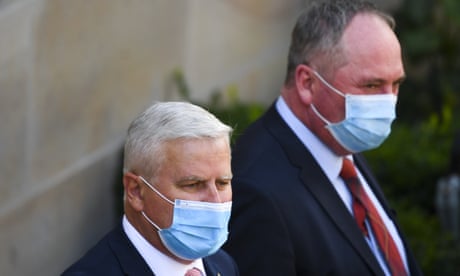- by foxnews
- 23 May 2025
Former deputy PMs unsure which meetings were of Scott Morrison’s secretive cabinet committee
Former deputy PMs unsure which meetings were of Scott Morrison’s secretive cabinet committee
- by theguardian
- 22 Sep 2022
- in news

Former deputy prime ministers Barnaby Joyce and Michael McCormack did not always know if the "deep dive" policy meetings they attended were actually meetings of Scott Morrison's secretive cabinet subcommittee.
McCormack told Guardian Australia it was a "regular process" to have stakeholders including outer ministry colleagues, officials and "captains of industry" attend meetings in the cabinet room.
McCormack said he was "definitely" a member of the cabinet office policy committee, but he was "not sure" if meetings attended by external stakeholders were COPC meetings.
Joyce said there was "nothing distinctly different" about the meetings he attended compared with the processes of former Liberal prime ministers, but he knew them only as "deep dives", not as policy committee meetings.
The COPC has been criticised by Labor and crossbench senators as an "abuse of process" that allowed meetings between Morrison and people outside cabinet to be shrouded in cabinet confidentiality.
On Wednesday Guardian Australia revealed the committee - of which Morrison was listed as the only permanent member - created 739 sets of minutes from meetings, suggesting it met hundreds of times in the last term of parliament.
After Anthony Albanese's criticism of the "cabinet committee with one member on it" Morrison responded through a spokesperson that the deputy prime minister, treasurer and finance minister "were co-opted on to all meetings of any COPC" except national cabinet, a form of "automatic participation".
"If I'm completely honest, if it's outside your policy area, you attend more than you participate, because you don't have the specialist knowledge," he said.
"You sit around the table, you read your paper; the process under Morrison was nothing distinctly different to under Tony Abbott or Malcolm Turnbull.
"Prime ministers in general are privy to more knowledge than most - so they do most of the talking."
Joyce declined to nominate policies that had been developed through the deep dive process, citing cabinet confidentiality.
McCormack said the meetings "discussed everything from drought to infrastructure", often drawing in officials or assistant ministers with specialist knowledge, such as then regional health minister Mark Coulton.
"It was all done according to process and protocol in the context of good cabinet government," he said.
McCormack said he "can't recall" whether people who were not members of the executive attended, and he "didn't think" that business people were members of COPC.
"There were certainly captains of industry around the cabinet table, although I'm not sure they were COPC meetings.
"We have met with them from time to time, along with relevant ministers to give a briefing to cabinet ministers."
McCormack said input from external stakeholders was not to determine policy but rather to give advice, citing for example "many, many meetings" with the Indigenous coalition of peaks and its convener, Pat Turner.
The Department of the Prime Minister and Cabinet's freedom of information decision reveals that minutes of the national cabinet, which met 66 times in the last term, and women's safety taskforce, which appears to have met eight times, are included in the bundle of 739 COPC minutes.
That leaves as many as 665 sets of minutes unaccounted for, implying hundreds of previously undisclosed meetings, even if some may have had multiple note-takers.
But Joyce and McCormack cast doubt on the suggestion of hundreds of meetings.
"I'm not sure there were hundreds," McCormack said. "I was invited to each and every one, and I mostly went unless there was a diary clash."
"How long is a piece of string? I can't remember how many there were, I didn't keep a running tally."
A PMC spokesperson said meetings "may have multiple minutes" but declined to answer questions about how many times the COPC met. "It is inaccurate to equate the number of minutes to the number of meetings."
In August, Albanese said the COPC allowed Morrison "to avoid scrutiny for meetings".
Morrison defended the COPC, telling Guardian Australia through a spokesperson it allowed ministers, officials, experts and members of parliament to participate in a "more targeted, effective and dynamic" process than regular cabinet subcommittees.
These helped the government "[to respond] to significant issues, consider strategic policy direction and to assist in the early stages of preparing cabinet submissions, including budget submissions", the spokesperson said.
"Numerous meetings were held across the full spectrum of federal government policy responsibilities. The COPC process proved very effective and practical in working though complex policy issues.
"The process was modelled on the [national security committee] and [expenditure review committee] process, where officials and experts join these discussions to assist with discussion of policy development."
The former finance ministers Simon Birmingham and Mathias Cormann referred questions about COPC to Morrison.
- by foxnews
- descember 09, 2016
United Airlines flight returns to Hawaii after concerning message found on bathroom mirror; FBI investigating
United Airlines Flight 1169 to Los Angeles returned to Hawaii after a "potential security concern" aboard the plane. The FBI and police are investigating.
read more


